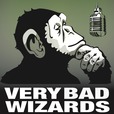Episode 126: The Absurd

Summary: <p>Is life meaningless? Are humans just glorified dung beetles, pushing around our piles of poop with no greater purpose? What would it take for life to actually be meaningful? In this episode, Tamler and David discuss Thomas Nagel’s essay on the sense of meaninglessness and absurdity that can so easily creep into human existence (with a special emphasis on the work of Camus and the philosophy of Rick and Morty). But first we tackle even more important questions about the human condition such as, why is it easier to detect the size of a hole with your tongue than with your little finger? And which moral "dilemmas" are actually moral no-brainers? (In the process, we even solve the problem of free speech on campus. You’re welcome.) </p><p><a rel="payment" href="https://www.patreon.com/verybadwizards">Support Very Bad Wizards</a></p><p>Links:</p><ul> <li><a title="The Extent of Skin Bending Rather Than Action Possibilities Explains Why Holes Feel Larger With the Tongue Than With the Finger. - PubMed - NCBI" rel="nofollow" href="https://www.ncbi.nlm.nih.gov/pubmed/29022729/">The Extent of Skin Bending Rather Than Action Possibilities Explains Why Holes Feel Larger With the Tongue Than With the Finger. - PubMed - NCBI</a></li> <li><a title="Pure joy: a colorblind man sees color for the first time" rel="nofollow" href="https://kottke.org/17/09/pure-joy-a-colorblind-man-sees-color-for-the-first-time">Pure joy: a colorblind man sees color for the first time</a></li> <li><a title="Dan Harmon Reveals the Meaning of Life in RICK AND MORTY | Nerdist" rel="nofollow" href="http://nerdist.com/dan-harmon-meaning-of-life-rick-and-morty/">Dan Harmon Reveals the Meaning of Life in RICK AND MORTY | Nerdist</a></li> <li><a title="Microcosmos - Dung beetle rolls ball and gets stuck. - YouTube" rel="nofollow" href="https://www.youtube.com/watch?v=AHpIlS6F2gM">Microcosmos - Dung beetle rolls ball and gets stuck. - YouTube</a></li> <li><a title="Nagel, T. (1971). The absurd. The Journal of Philosophy, 68(20), 716-727." rel="nofollow" href="https://philosophy.as.uky.edu/sites/default/files/The%20Absurd%20-%20Thomas%20Nagel.pdf">Nagel, T. (1971). The absurd. The Journal of Philosophy, 68(20), 716-727.</a></li> <li><a title="Camus, A. (1955). The myth of Sisyphus, and other essays. Vintage." rel="nofollow" href="https://s3.amazonaws.com/academia.edu.documents/32845926/Camus_-_The_Myth_of_Sisyphus_and_Other_Essays.pdf?AWSAccessKeyId=AKIAIWOWYYGZ2Y53UL3A&Expires=1508696047&Signature=0W%2BIwWGfYUHthArlTUqC2lRqIfY%3D&response-content-disposition=inline%3B%20filename%3DThe_Myth_Of_Sisyphus_And_Other_Essays_Co.pdf">Camus, A. (1955). The myth of Sisyphus, and other essays. Vintage.</a></li> </ul>